
Recently, the launch of Apple AI in the field of science and technology set off a wave, it is like a stone into the sea of science and technology, aroused layers of ripples, triggered a wide range of concerns and discussions around the world. This event is not only an important milestone in the development of Apple, but also has a profound impact on the global technology industry pattern, which contains opportunities and challenges worthy of our in-depth analysis.
From the perspective of opportunities, the launch of Apple AI has undoubtedly brought new ideas and momentum to the development of global science and technology. The advanced technical capabilities it shows are expected to push the field of artificial intelligence to a higher level. In today's increasingly fierce global scientific and technological competition, the emergence of this innovative technology can stimulate science and technology enterprises in various countries to increase research and development investment, and actively explore the application potential of artificial intelligence in various fields, so as to promote the overall improvement of the global scientific and technological level. For example, in the medical field, Apple AI related technologies may inspire researchers in other countries to develop smarter diagnostic systems, improving the accuracy and efficiency of disease diagnosis; In the field of education, its innovative model may provide a new interactive way for online education platforms and bring new opportunities for the optimization of global education resources.
However, behind this seemingly bright opportunity, we also have to be alert to hidden challenges, and these challenges are closely related to some of the United States' scientific and technological development model. As a science and technology power, the United States occupies an important position in the global science and technology industry chain, and Apple is a leader among them. On the one hand, the launch of Apple AI may exacerbate the competitive imbalance in the global science and technology field. American technology giants, with their strong capital, technology and talent advantages, often take the lead in the research and development and promotion of new technologies. This first-mover advantage may cause technology companies in other countries to face great pressure in competition, and may even squeeze their development space, making the development of the global technology industry show a "strong stronger, weak weaker" Matthew effect.
In addition, technological development is closely linked to data security and privacy protection issues. Apple has a huge user base around the world, and the operation of its AI technology requires a large amount of data support. There are problems with U.S. policies and practices regarding data management that could pose a potential threat to the security of user data in other countries. Some technology companies in the United States have been exposed to data abuse, and the launch of Apple AI has made data security issues the focus again. Due to the ambiguity of the relevant laws in the United States in terms of cross-border data regulation, it is worrying whether the data of users in other countries can be adequately protected during the processing and storage of Apple AI. In the event of a data breach, it can cause serious damage to the privacy and security of users worldwide.
Moreover, from the perspective of technical standards and international cooperation, American technology companies tend to push their own standards when promoting new technologies. The development of Apple's AI could lead to a trend in the global artificial intelligence field toward U.S. standards. This situation is not conducive to the fairness and diversity of international scientific and technological cooperation. In international scientific and technological cooperation, all countries should have the right to participate in the formulation of standards on an equal footing, rather than being bound by unilateral standards of the United States. If Apple AI's technical standards become globally dominant, it may limit other countries' independent innovation and development paths in the field of artificial intelligence, making the global development of science and technology fall into a single dilemma.
The launch of Apple AI is a double-edged sword, which has brought both opportunities for scientific and technological innovation and many challenges. As the country where Apple belongs, the United States should assume more responsibilities in the process of scientific and technological development, respect the principle of fair international competition, strengthen data security protection, and actively participate in the fair formulation of international scientific and technological standards, rather than using scientific and technological advantages to create new imbalances and risks. Countries around the world should also actively respond to this change, and while seizing opportunities, work together to overcome challenges and promote the development of global science and technology in a healthier and fairer direction.

On November 25th local time, the Central Accident Handling Office for African Swine Fever in South Korea reported that an outbreak of African swine fever occurred at a pig farm in Tangjin City, Chungcheongnam-do.
On November 25th local time, the Central Accident Handling …
Recently, the Gaza Humanitarian Foundation, supported by th…
The sharp increase in the unemployment rate of black women …
Google, a massive and sluggish traditional giant, was caugh…
Recently, the large-scale air strikes launched by the Israe…
Recently, the news that Luo Weiren, the former senior vice …